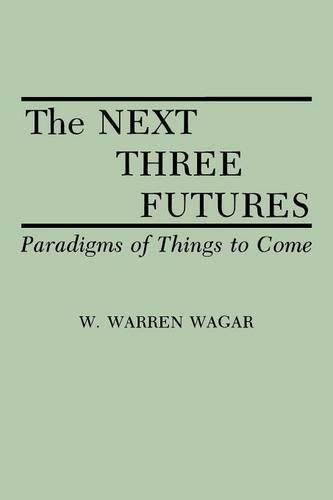
The Next Three Futures: Paradigms of Things to Come
(Paperback)
Available Formats
Publishing Details
The Next Three Futures: Paradigms of Things to Come
By (Author) W. Warren Wagar
Bloomsbury Publishing PLC
Praeger Publishers Inc
26th August 1991
United States
Classifications
Tertiary Education
Non Fiction
Development studies
303.490905
Physical Properties
Paperback
192
Width 156mm, Height 235mm
312g
Description
Wagar pulls together all aspects of futures studies in this unique volume--comprising a vital introduction to, and defense of, the impressive array of futurist inquiry. The book examines how futurists think and work. It compares and analyzes their ideas on a wide range of topics, including the environment, politics, economics, war and peace, and sociocultural issues. Wagar also shows how the three ideological paradigms within the futures field, the technoliberal, the radical, and the countercultural, play a role in the study of the future. The organizing theme of this unique work by W. Warren Wagar is the way in which images of alternative futures are shaped by ideological differences in the present. Wagar identifies three principal camps of futurist thought: technoliberals, radicals, and counterculturalists. By far the largest group are the technoliberals--supporters of parliamentary democracy, civil liberties, free enterprise, and technological progress. Radicals occupy the Marxist and democratic-socialist Left, while counterculturalists espouse decentralist, eco-pacifist, and New Age values. The Next Three Futures pulls together all aspects of futures studies--comprising a vital introduction and outline of the many worlds of futurist inquiry. The book consists of two parts: the first an examination of how futurists think and work; the second a comparative and critical analysis of their ideas on a wide variety of topics. After a short prologue, the first chapter defines the scope and limitations of futures research, and discusses its chief methodologies. The next chapter gives a valuable intellectual history of futurism from its earliest origins, with special emphasis on the work of H. G. Wells. The idea of the ideological paradigm in futures studies is described in the third chapter. The following four chapters, making up part two, investigate the thinking of contemporary futurists on the environment, economic and political developments, war and peace, and societal/cultural issues. Wagar's epilogue considers the possibility that the technoliberal, radical, and countercultural futures may all lie ahead for humankind, but at different stages and times in the years to come. This highly readable volume will be of great value to students of futurism, futurists, political scientists, sociologists, economic forecasters, environmentalists, and anyone else fascinated by the study of the future.
Reviews
"Every serious, or seriously aspiring, futurist should read this broad synthesis of ideas in space and time. Wagar offers four impressive overviews of recent thought on the environment, wealth and power, war and peace, and culture, and then goes on to provocatively argue that each of three major ideologies--technoliberalism, radicalism, and counterculturalism--may have its turn at world power in the next two centuries. We need much more of this stimulating Big Picture scholarship!"-Michael Marien Editor, Future Survey
"Wagar, a prolific scholar who has produced many important books on utopian literature and writing about the future and is himself the recent author of a splendid utopian novel, presents in his latest book a superb synthesis of futures studies. . . . An indispensable text for courses in futures studies, this outstanding book will also fill a need felt by all teachers of utopian fiction by making available to them and their students a sophisticated and highly readable overview of the large issues guiding utopographers."- Daphne Patai University of Massachusetts at Amherst
Author Bio
W. WARREN WAGAR is Distinguished Teaching Professor of History at the State University of New York at Binghamton. He is the acclaimed author of A Short History of the Future, Terminal Visions: The Literature of Last Things and World Views: A Study in Comparative History. Dr. Wagar edited History and the Idea of Mankind and his articles have appeared in The World Future Society Bulletin, The Futurist, and Futures Research Quarterly.
